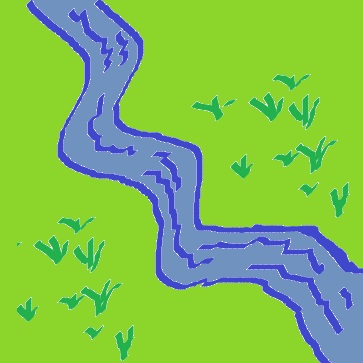Foundations of a Green Theology: Creation and ExileGreen theology is a way of framing our faith, beliefs and actions to lead us to be good caretakers of the earth, respectful of natural resources, humans, animals and land. It is a recognition of the elements of our faith traditions that support us in leading lives that are conscientious and harmonious with the world we live in. This should be an easy connection: our belief in God as creator leads to the gift and responsibility of creation care. But many churches struggle against these ideas. One of the possible challenges to a green theology is the tension between a theology that sees a world in exile and a theology that is fully engaged in the present time and place. The creation narratives throughout the Bible clearly describe the world as created by and belonging to God. For example, Psalm 24 opens with these verses: "The earth is the Lord's, and everything in it; the world, and all who live in it; for he founded it on the seas;
and established it on the water." And a poetic verse from the prophet Isaiah:
"For thus says the Lord, who created the heavens (he is God!), The idea of creation care flows from our belief in God as creator:
When I look at the night sky and see the work of your fingers- But there is a philosophical tension in faith traditions. Is God found in the physical world or in a more spiritual realm? Are people of faith supposed to focus on this world or on a heavenly world? Many popular hymns point to a heavenly realm, away from the world, with verses such as "this earth is not my home." Modern language reflects this separation between earthly and spiritual realms; with, for example, the English word "worldly" suggesting that to be connected to the physical world is to be non-spiritual. Some of this philosophical tension arises from the Jewish people's experiences of exile. The experience of exile had a strong influence on shaping the Old Testament scriptures. Throughout the Old Testament, themes of living in exile are intermingled with themes of being at home in God's world. Especially while living in exile in Babylon, the Jewish people struggled with the question of whether they could ever be "at home" in a place that was not their own land. This experience of exile helped the Jewish people to confront the tensions between goodness and evil in the world, and to gradually come to an even fuller understanding of monotheism, understanding what it means to worship one God, who created and sustains the whole world. The experience of exile from a native land has parallels in the idea of earth itself as a place of separation and exile. Through contact with Babylonian, Persian and other cultures, the Jewish people encountered mythology that suggested that the world was ruled by two competing deities, with a good and an evil power competing for the world, or with the earth belonging to the evil power and the heavenly realm belonging to the good. For the Jewish people, though, the ultimate answer is that God alone is all-powerful, and the earth and heavens belong to him. Even if we go through difficult times, God is present. We go through times of feeling like we are in exile or times of "waiting" but also times of putting down roots and being fully present wherever we are. Contrast the words of Psalm 137:1-4 By the rivers of Babylon we sat and wept And the words of Jeremiah 29:4-7 This is what the Lord Almighty, the God of Israel, says to all those I carried into exile from Jerusalem to Babylon: "Build houses and settle down; plant gardens and eat what they produce. Marry and have sons and daughters; find wives for your sons and give your daughters in marriage, so that they too may have sons and daughters. Increase in number there; do not decrease. Also, seek the peace and prosperity of the city to which I have carried you into exile. Pray to the Lord for it, because if it prospers, you too will prosper." REFLECTION: What are the implications of these philosophical tensions ("the earth is not my home" vs. "the earth is the Lord's") for an understanding of green theology? J.M.L. |
